|
|
|
Sort Order |
|
|
|
Items / Page
|
|
|
|
|
|
|
| Srl | Item |
| 1 |
ID:
107142


|
|
|
| 2 |
ID:
192157
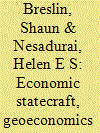

|
|
|
|
|
| Summary/Abstract |
In this introduction to the special issue, we establish the overarching objective for the collection; to investigate the salience and efficacy of conceptions of Economic Statecraft (ES) and Geoeconomics for understanding and explaining shifts in state-market relationships in a number of regional political economies. After a very short overview of different generations of ES research, we establish the set of common questions that each of the papers address, and how we arrived at them as the research project evolved. We point to the importance of ensuring that ES is not just thought of as something that the more powerful regional states engage in, and the need to adopt a three-part analytical distinction between different components of ES: motivations and objectives; actions and tools; and outcomes and consequences. This allows us to trace the relationship between goals and effects, provides a basis for comparative studies, and makes it easier to make a distinction between ES and other forms of state involvement in the economy.
|
|
|
|
|
|
|
|
|
|
|
|
|
|
|
|
| 3 |
ID:
186200
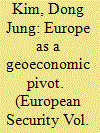

|
|
|
|
|
| Summary/Abstract |
Intensifying strategic competition with China has introduced the need for the United States to consider extensive and stringent economic restrictions against the rising power. This article suggests that US economic containment of China is unlikely to materialise due to the presence of the EU states that are not militarily threatened by the geographically separated China and in a position to prioritise economic benefits in exchanges with that state. It first identifies the role of the EU in China’s foreign economic exchanges and addresses the ability of the EU states to replace the economic function of the United States in China. Then, it discusses how geographical conditions surrounding China make the rising state largely an East Asian threat. It suggests that, devoid of any direct military threat from China, the EU states can undermine the effectiveness of substantial US economic containment measures against China by functioning as alternative economic partners or facilitating China’s construction of alternative economic routes. Finally, this paper discusses the limitations in US ability to constrain the EU states’ economic exchanges with China. While concerns grow over Washington’s economic assertiveness against Beijing, the feasibility of a US-led upheaval in economic relations involving China should be carefully gauged.
|
|
|
|
|
|
|
|
|
|
|
|
|
|
|
|
| 4 |
ID:
125079


|
|
|
|
|
| Publication |
2013.
|
| Summary/Abstract |
This article addresses conceptually the European Union (EU)'s security actorness, explaining its meaning, identifying the factors that are constitutive to the concept, and analyzing whether the EU is a security actor in Georgia, through its increased presence and engagement in the country and its eventual implications for the South Caucasus. The article argues that the complementary nature of the different EU tools deployed on the ground and their comprehensive nature have contributed to the EU's consolidation as a security actor in the South Caucasus. However, and despite the successful assessments of the European Union Monitoring Mission in the context of common security and defense policy development, the mission's deployment and its contribution to regional stability are influenced to a great extent by the role and involvement of external players, in particular in this case, that of Russia
|
|
|
|
|
|
|
|
|
|
|
|
|
|
|
|
| 5 |
ID:
092757
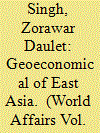

|
|
|
| 6 |
ID:
149116


|
|
|
|
|
| Publication |
Oxon, Routledge, 2017.
|
| Description |
ix, 115p.hbk
|
| Standard Number |
9781138205413
|
|
|
|
|
|
|
|
|
|
|
|
Copies: C:1/I:0,R:0,Q:0
Circulation
| Accession# | Call# | Current Location | Status | Policy | Location |
| 058876 | 551.467/DOY 058876 | Main | On Shelf | General | |
|
|
|
|
| 7 |
ID:
151539
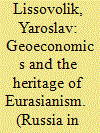

|
|
|
|
|
| Summary/Abstract |
When discussing Russia's pivot to the East and its key foreign economic priorities, it is important to remember Russian economic thought of the last century, the relevance and merits of which are yet to be studied. Conceived almost a hundred years ago, the theory of Eurasianism has played an important role in exploring transcontinental alliances and economic interaction between Europe and Asia. The theory holds that Russia's development should be based on what makes it distinct from other countries; namely, its geographical, historical, cultural, and economic peculiarities. Russia can advance economically by taking advantage of its geographical position between Europe and Asia as interaction intensifies between these two focal points of the global economy.
|
|
|
|
|
|
|
|
|
|
|
|
|
|
|
|
| 8 |
ID:
145425
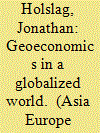

|
|
|
|
|
| Summary/Abstract |
This paper explains why and how China seeks to continue to promote export-driven industrialization. This way, it comes as a corrective to the widespread assumption that the Chinese government is readying to rebalance its growth from investment and export to more domestic consumption. But the paper also presents an important case of a largely geoeconomics strategy. What explains China’s quest for industry, it finds, is a quest for economic security, economic competitiveness, and more economic independence from large foreign suppliers of capital, brands, and knowhow. What characterizes the consequent policy, the paper goes on, is an increasingly more sophisticated push for exports. China’s aim in that regard is not to undermine the relatively open global market, but to bend the trade flows into its advantage by means of export credit, tax rebates, and so forth.
|
|
|
|
|
|
|
|
|
|
|
|
|
|
|
|
| 9 |
ID:
145422
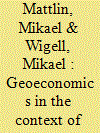

|
|
|
|
|
| Summary/Abstract |
Geoeconomic power and its use appear to be a crucial, albeit understudied aspect of today’s international relations. Traditionally, international power has been thought of in geopolitical rather than geoeconomic terms. Indeed, ever since the famous debate about sea power and land power between Alfred Thayer Mahan and Halford MacKinder at the cusp of the twentieth century, scholars have linked geography with the pursuit of political and military power.
|
|
|
|
|
|
|
|
|
|
|
|
|
|
|
|
| 10 |
ID:
160432
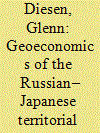

|
|
|
|
|
| Summary/Abstract |
Russia’s effort to become a geoeconomic power in Asia alters the dynamics of the territorial dispute with Japan. Both Moscow and Tokyo aim to prevent Russia’s geoeconomic “pivot to Asia” becoming merely a pivot to China. Yet, a settlement is obstructed by the growing geoeconomic value of the Southern Kurils and Japan’s lack of an autonomous foreign policy.
|
|
|
|
|
|
|
|
|
|
|
|
|
|
|
|
| 11 |
ID:
142916
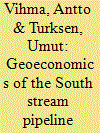

|
|
|
|
|
| Summary/Abstract |
Energy trade has developed into one of the most contentious and divisive issues between Russia and the EU in the post-Cold War era. It reflects a broader geoeconomic struggle in which economic means are used to advocate geopolitical goals. This article argues that the case of the South Stream Pipeline Project (SSPP)--a grand project abruptly cancelled by Russian President Vladimir Putin in December 2014--epitomizes these power politics. In 2014, Russian leadership advanced both geopolitical and geoeconomic strategies towards the ELI: pursuing the former by conducting a military campaign in Crimea and Eastern Ukraine; and pursuing the latter by pushing the construction of SSPP in spite of the EU's legal and political objections. Due to Russian military aggression in Ukraine, however, the EU was able to harden its line on SSPP. Russian geoeconomic activity has long been successful as a centrifugal, dividing power within the EU. The geopolitical campaign in Ukraine, in stark contrast, has been a centripetal force, resulting in increased EU unity that contributed to the SSPP's demise. This is evidence that claims of geoeconomics as a continuation of war by other means are potentially misleading. The means of geopolitical power projection and geoeconomic power projection thus have notably different effects in today's contemporary, interconnected world.
|
|
|
|
|
|
|
|
|
|
|
|
|
|
|
|
| 12 |
ID:
158358
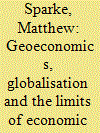

|
|
|
|
|
| Summary/Abstract |
This paper is a response to Antto Vihma’s article ‘Geoeconomic Analysis and the Limits of Critical Geopolitics: A New Engagement with Edward Luttwak’. Taking issue with Vihma’s critique of the limits of critical geopolitics, it argues that it is instead the use of economic strategies in statecraft – Vihma’s state-centric vision of geoeconomics inspired by Edward Luttwak – that is really better understood as limited. To map these limitations, it is necessary to attend to three specific limits: first, the limits of conceptualising geoeconomics in simply instrumental terms as a tool of statecraft; second, the limits of capital and specifically the ways in which the geographical limits created by the on-going tensions between spatial fixity and spatial expansion in capitalism are refracted through the on-going entanglements of geopolitics and geoeconomics; and third, the limits of personal positionality and the emotional fears, hopes, dreams and passions that influence geostrategic discourse more generally. Reflecting on Donald J. Trump’s ascendancy to the US presidency, the paper concludes that it is now more necessary than ever to address how all these force-fields intersect to overdetermine the limits of economic strategy in statecraft.
|
|
|
|
|
|
|
|
|
|
|
|
|
|
|
|
| 13 |
ID:
145288
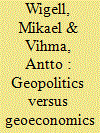

|
|
|
|
|
| Summary/Abstract |
Geopolitics and geoeconomics are often addressed together, with the latter seen as a sub-variant of the former. This article shows the usefulness of differentiating them at a conceptual level. By juxtaposing traditional geopolitics and geoeconomics, we suggest that they have remarkably different qualities and implications for their targets, on both national and international levels. Importantly, these include the formation of alliances, and whether they are driven by balancing, bandwagoning or underbalancing dynamics. An analysis of Russia's shifting geostrategy towards Europe shows these differences in practice. Russian geoeconomics has long been successful as a ‘wedge strategy’, dividing the EU. As a result, the EU has underbalanced and its Russia policies have been incoherent. The observable tendencies in 2014–15 towards a more coherent European approach can be explained by the changing emphasis in Russia's geostrategy. Russia's turn to geopolitics works as a centripetal force, causing a relative increase in EU unity. Centripetal tendencies due to heightened threat perception can be observed in the economic sanctions, emerging German leadership in EU foreign policy, and discussion on energy union. The analysis calls for more attention to the way strategic choices—geopolitics versus geoeconomics—affect the coherence of threatened states and alliance patterns.
|
|
|
|
|
|
|
|
|
|
|
|
|
|
|
|
| 14 |
ID:
046834
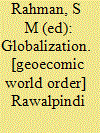

|
|
|
|
|
| Publication |
Rawalpindi Cantt. Rawalpindi Cantt.., Friends Publication, 2000.
|
| Description |
ii, 242p.
|
| Standard Number |
9698199144
|
|
|
|
|
|
|
|
|
|
|
|
Copies: C:1/I:0,R:0,Q:0
Circulation
| Accession# | Call# | Current Location | Status | Policy | Location |
| 044006 | 337/RAH 044006 | Main | On Shelf | General | |
|
|
|
|
| 15 |
ID:
158359
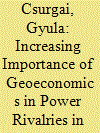

|
|
|
|
|
| Summary/Abstract |
Relations between states in the post-Cold War period have been shaped by an increased economic competition including ‘non-market’ factors such as intelligence sharing between state agencies and private businesses, successful economic diplomacy and different techniques to influence and manipulate non-governmental organisations to weaken an economic adversary, among other things. The considerable influence of these non-market factors illustrates the limits of the liberal economic theories that emphasise the dominant role of market forces. Geoeconomics is an interdisciplinary analysis that includes geopolitical factors, economic intelligence, strategic analysis and foresight and has the objective to provide a tool for states and businesses to develop and implement successful strategies to conquer markets, and protect strategic segments of the domestic economy, among other things. This article argues about the growing significance of geoeconomics in contemporary power rivalries, presents some strategic aspects of the role of state in the establishment and coordination of a national geoeconomic disposition, and highlights briefly the importance of the strategic management of information to support geoeconomic strategies. Some arguments of the article ‘Geoeconomic Analysis and the Limits of Critical Geopolitics: A New Engagement with Edward Luttwak’ are briefly discussed as well.
|
|
|
|
|
|
|
|
|
|
|
|
|
|
|
|
| 16 |
ID:
147474
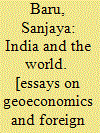

|
|
|
|
|
| Publication |
New Delhi, Academic Foundation, 2016.
|
| Description |
240p.Hbk
|
| Standard Number |
09789332703797
|
|
|
|
|
|
|
|
|
|
|
|
Copies: C:1/I:0,R:0,Q:0
Circulation
| Accession# | Call# | Current Location | Status | Policy | Location |
| 058789 | 337.54/BAR 058789 | Main | On Shelf | General | |
|
|
|
|
| 17 |
ID:
148107
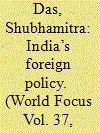

|
|
|
|
|
| Summary/Abstract |
India’s foreign policy in the 21st Century is appraised due to the interplay of geoeconomics with geopolitics and India’s search for a visible and a constructive role on the global map, the need for sustainable economic growth, energy security, food security and border disputes on the one hand and the United States’ Pivoting Asia and expecting India to take the lead role on the Indian Ocean. Therefore the core policy paradigm Nonaligned Movement (NAM) has come into strict scrutiny. The paper will deal with Non-aligned Movement from three angles a) NAM being the central factor in India’s foreign policy making, b) India’s role in NAM, c) NAM and Indo-US relation.
|
|
|
|
|
|
|
|
|
|
|
|
|
|
|
|
| 18 |
ID:
148112
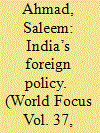

|
|
|
|
|
| Summary/Abstract |
In fine, there is no doubt that the leadership style of the PM Modi has raised the credit of India at the international level and his fresh coat of paint on India’s foreign policy has also created its image as a leading power in the 21st century. PM Modi’s unique approach to the Indian foreign policy has played a significant part in emerging ties with the leading countries of the world and the future of India’s foreign policy looks very bright. In the era of globalisation, where geoeconomics has become prime centre of the world countries, therefore, PM Modi has also focussed on the Indian foreign policy and fine-tuned according to the need of hour, and during his half tenure, the fruits of changes in Indian foreign policy have become visible, and one can see that, at present, India and the United States of America have become very close to each other than earlier and both are standing at one platform and therefore the 21st century will be witnessed of their close partnership.
|
|
|
|
|
|
|
|
|
|
|
|
|
|
|
|
| 19 |
ID:
121400
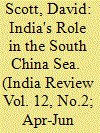

|
|
|
|
|
| Publication |
2013.
|
| Summary/Abstract |
This article looks at the South China Sea, an area of dispute between China and other littoral states, as a new area of geopolitical and geoeconomic interest for India. The article follows the strategic discourse on the South China Sea circulating in the Indian government and wider strategic community, and brings in Chinese responses and interpretations of India's involvement. India's role in the South China Sea is four-fold: first, naval deployments; second, increasing strategic-military links with littoral states like Singapore, Indonesia, the Philippines, and Vietnam; third, economic involvement of Indian energy companies in South China Sea waters; and fourth, discussions between India and other regional and extra-regional China-concerned powers about the South China Sea. India's involvement in the South China Sea represents a new development in its Look East Policy, a new balancing factor in the interplay of actors within these waters, and a new friction factor within India-China relations.
|
|
|
|
|
|
|
|
|
|
|
|
|
|
|
|
| 20 |
ID:
145424
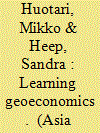

|
|
|
|
|
| Summary/Abstract |
China’s rise is increasingly impacting on the global financial and monetary order. To manage its growing centrality in global financial flows and its new relevance for patterns of currency usage, Beijing has been creating a set of new institutional arrangements in three crucial fields: the provision of crisis liquidity, development financing, and a global infrastructure to internationalize its currency. In contrast to the dominant power political interpretation of such developments, this article highlights the strong linkages of Beijing’s new initiatives with the changes in China’s capitalist development path and stresses their experimental character that serves to manage the economic and political risks of China’s accelerating financial internationalization.
|
|
|
|
|
|
|
|
|
|
|
|
|
|
|
|
|
|
|
|
|